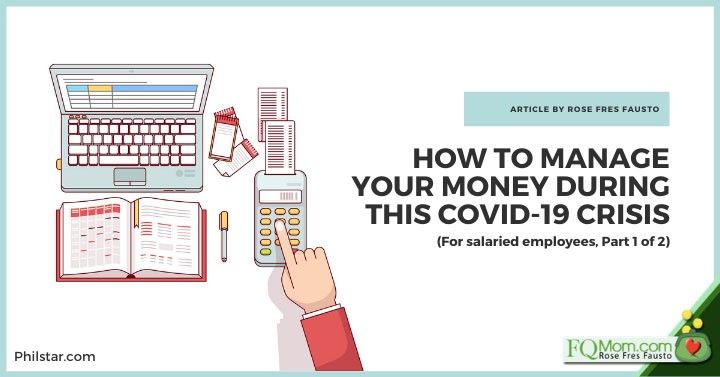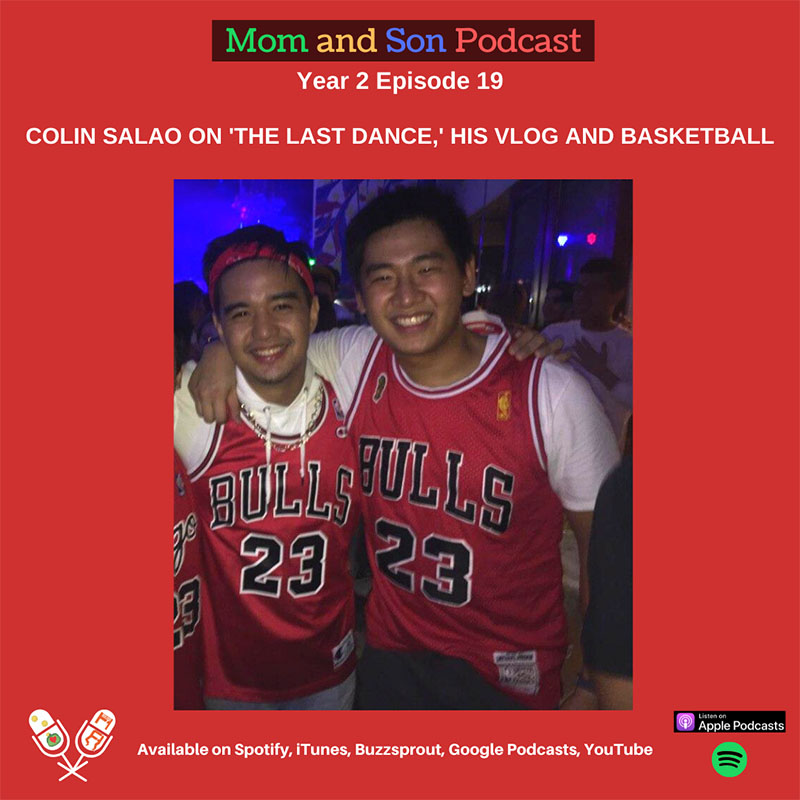How to manage your money during this COVID-19 crisis (For salaried employees, part 1 of 2)


It’s our day 57 in this enhanced community quarantine. Some have gotten used to the situation, while others are raring to go back outside, hoping for things to go back to normal.
Unfortunately, things may never go back to “normal.” If we keep the latest ECQ end date, this week is the last week before we transition to GCQ (general community quarantine). This means that there will be a resumption of operations in some offices and businesses and a modification in the suspension of transportation.
Amidst all these, life goes on and expenses go on. How should you manage your money now during the crisis?
This will depend on your source of income at the moment. For today’s article let’s discuss what you should do if you were among the lucky ones with stable income – i.e. you are still receiving your salary in full and your employer has not given you notice that puts your stable income in danger.
1. Continue to pay your bills on time. Even if your utility and credit card companies are giving you extensions on your due dates, pay on time if you can. You may argue that you wish to take advantage of the float (the interest that you can earn by not yet paying), you are better off paying them on time. You don’t want your bills to pile up. Moreover, paying on time helps create a semblance of normalcy, something valuable to all of us now that a lot of things are abnormal and uncertain. If you still insist on taking advantage of the float, just make sure you can keep your emotions in check – i.e. you will not feel artificially liquid, and you will not feel overwhelmed once all of your previous months’ bills become due and demandable.

2. Do not withdraw your long-term investments. When the market crashed right after the announcement of the lockdown, I received several calls and messages asking if they should sell their stock positions. If your money in the stock market is for your retirement or other long-term goals, please stay calm and don’t sell. Remember you only incur the loss in your retirement/long-term investment if you sell now. This is the reason why I immediately published my mini e-book entitled “The Emotional Cycle of Investing (A mini ebook to calm my nerves)”. I thought it came at a perfect time because it was published on the day the PSE index plummeted to as low as 4,039! I hope the book was able to do its purpose – i.e. to calm your nerves using easy-to-understand language and emojis. If you haven’t gotten your copy yet, click this link.
3. If you were on your way to wiping out your debt as part of your FQ journey, continue doing so. Since you are still receiving your salary in full, discipline yourself to stay the course. This also matters a lot to the people/entities that you have promised to pay. In the end, what matters more are relationships and you are better off taking care of them. A lot of relationships break down because of money issues, don’t make your relationships suffer due to this. Share this on Twitter.
4. Say no to luxury for the meantime. I have an easy-to-understand FQ Guideline on luxury-spending. “Buy luxury only if you can afford to buy 10 pieces of it!” This is so because it’s easy to remember, just add one zero. This is a hack to the third law of money which goes: Make your gold work for you. Make an army of golden slaves before you buy luxury. What if you can still afford 10 or 100 pieces of it? Well, times are uncertain right now and we do not know when this economic downturn will recover. It is also an emotional and social management. We do not want to be splurging on luxury right now when most of our fellow Filipinos are in difficult financial situation.

5. Be wary of easy-to-get loans. There are advantages and disadvantages of easy to acquire loans. For someone in dire need of cash (and assuming he has the capability to repay the loan), this is heaven-sent as he will not have to go through so many documentations and red tape just to bridge the temporary financial gap. For others who do not need to incur a loan or who cannot afford to pay the loan, with all its hidden costs and unfavorable terms and conditions, you are better off not digging this potential “financial grave.” I use that term as a take-off from the vernacular baon sa utang. If we easily grab these “seductive” loans without careful thought, we might not exhaust other alternatives such as liquidating some idle assets, cutting expenses, improving cash inflow, etc. Share this on Twitter.
6. Calculate your savings due to ECQ and invest them. While you continue to receive the same amount of salary and you stop spending on transportation, eat-out, shopping, vacation, etc., you are sitting on an increase in net cash inflow. What do you do with that? Check your emergency fund. If it is still below your desired level, add all extra savings to it. If you have completed the amount, invest in your middle and long-term buckets.
7. Make/update your balance sheet. If you still don’t have one, please create your own balance sheet. If you have used the FQ Balance Sheet Template, I hope you did your quarterly update last March 31, 2020. If not, it’s time to update. What this will do is to give you a bird’s eye view of your financial condition. You may find that you have idle assets sitting around that you can liquidate. It also allows you to check your asset allocation, if it is still in line with your goals. It will also propel you to do the necessary things to achieve the financial goals you set at the start of the year.
8. Work hard, do well in your job. The WFH (work from home) set-up has given us all sorts of challenges. Working without being physically together deprives us of the benefit of body language and fun of being together with workmates. It has also given us the challenge to do deep work especially for parents of young children, or those without the necessary infrastructure for WFH. But there are also advantages to this set-up that you may focus on – no more wasted time in traffic, the savings discussed in no. 6, etc. List them down, and be grateful for the gift of work that still provides you with stable salary. Go back to the core value of your job so you can serve better. Your great service does not only benefit your company and your clients, but benefits you the most. It improves your skills and deepens your relationships with your clients and co-workers. As mentioned in no. 3, in the end, relationships are what matter. Share this on Twitter.

I hope the above eight items will help you manage your money during this unprecedented pandemic. Next week, we will discuss part 2 which is for those with unstable income. Cheers to high FQ!
********************************
ANNOUNCEMENTS
1. Listen to our Mom and Son Podcast episode this week! Click here.

2. We will go #LiveAtFive on May 15, 2020 (Friday) with our FQ story contest winners! Join us for a fun kwentuhan on FQ Mom’s Facebook Page.

3. Reading is another coping mechanism for the lockdown. If you haven’t yet, may I invite you to read any of the FQ Mom books?

4. If you haven’t yet, now is the time to start your FQ journey. If you’ve taken this six or so months ago and you want to check how you have improved, you may take it again by clicking the link: https://forms.gle/tSHBiGtwpWHaKVzU9




















